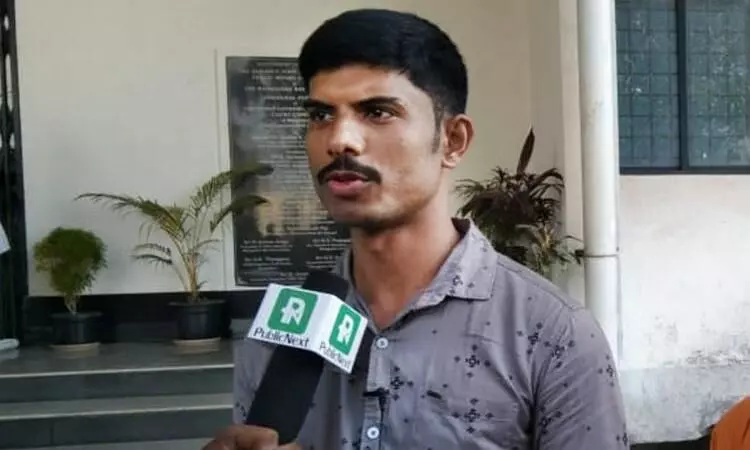

Accused as Naxal: Journalist took nine years to clear his name
text_fieldsDakshina Kannada/Karnataka: Vittala Malekudiya and Lingappa Malekudiya members of a tribal community who reside deep in the Kudremukh forests of Karnataka took nine years to prove that they are not Naxals, The News Minute (TNM) reports. The father-son pair spent four months in jail and moved between the court, police and lawyers numerous times within the nine years to receive justice in the end.
The duo were arrested in March 2012 by the Anti-Naxal Force alleging links with the dreaded Communist Party of India (Maoist Leninist) People's war. Police barged into Vittala's home and assaulted Lingappa, breaking his leg. Vittala, who was the first to go to college from his village, was 23 years old then and doing postgraduation in journalism at Mangalore University. They were presented before the court with the evidence, namely a cupboard containing books, old newspapers and four pamphlets.
One of the pamphlets is a statement of an environmentalist group that condemned the then state government's move to displace tribals from forests, while another one called for a protest against the government's acquisition of tribal lands. The last two pamphlets called for an election boycott to protest the failure of successive governments to provide basic amenities. Also, the task force found a book on Bhagat Singh. The rest of what was seized were a bag of kitchen wares, a pair of binoculars, a torch, school books, a mobile phone and two charging clips.
The charge sheet against the two said that newspaper clips and documents found in the cupboard were anti-government, anti-police and critical of operations carried out by Anti-Naxal Force. It also noted that both of the arrested could not provide satisfactory answers about the seized. But, it couldn't produce further evidence to show that the arrested have relations with any criminal organisations. However, Vittala and his father were charged with sedition, criminal conspiracy, and terror under the Unlawful Activities (Prevention) Act (UAPA).
Advocate for Vittala, Dinesh Ulepady, said that police was building the case to harass tribals, and the recovered materials were never related to Maoism. The paper clips were related to ecology of the Western Ghats and tribal rights.
According to TNM, there were reasons for the police to target the Malekudiyas. Vittala was involved in protests conducted by the Communist Party of India's (Marxist) youth wing DYFI. He was also a vital source for journalists for happenings in the forests of Kudremukh national park.
While Vittala was imprisoned, he was allowed to write his university examinations but was in the presence of police and was forced to wear handcuffs. The visuals of him in handcuffs sparked outrage, and following that, the then Karnataka BJP chief minister Sadananda Gowda promised withdrawal of the case on Vittala.
Though the police insisted that the Malekudiyas were part of the Naxal group by building the case on three mobile phones seized from Vittala's home, the district judge hearing the case said that the police could not produce incriminating evidence from the phones to prove their claim.
The judge further said that possessing books on Bhagat Singh, reading newspapers, or mere possession of newspaper cuttings does not amount to an offence.
The judgement proved Vittala and his father innocent, but no action was taken against the police officials who charged such dangerous cases over the two. Vittala said that during his arrest, police used to force their way into houses in his village, conducted arbitrary searches, and urged the villagers to leave the place after taking the government's compensation.
The condition of his village has improved through the past nine years, though still there are shortages of basic amenities. Raids by police have been reduced and no one is calling them Naxals. But he also says that in the country, now it has become difficult for people like him to voice their opinions and fight for their rights. Many were branded as anti-national in recent years just because they think differently.
Vittala graduated from the University of Mangaluru and is now a journalist with a Kannada daily in Bengaluru. He said that his legal struggle was enough to wear him down, but his friends and strangers who believed in him enabled him to keep up his fight.





















